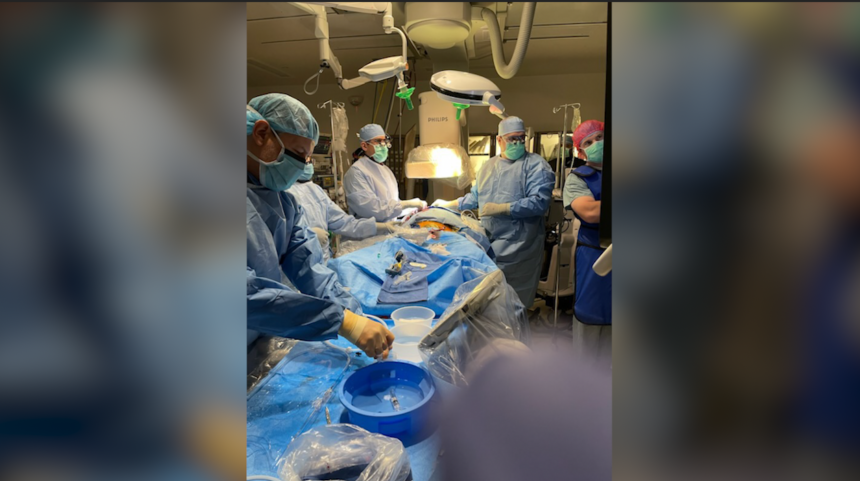New vascular surgery procedure now available in El Paso

Trans-Carotid Artery Revascularization offered at UMC clinic
EL PASO, Texas -- An El Paso vascular surgeon saved a man's life by slicing his throat.
And it all happened while the patient was awake.
Jack Hall likes to joke that he lived to tell the tale.
"I was awake the whole time, and said, 'Hey! You just slit my throat!' And I survived. Oh boy!" Hall added, shaking his head in disbelief.
The procedure is called Trans-Carotid Artery Revascularization, and it's the first time it's been performed in El Paso.
"In simple terms, it's stenting into a carotid artery, which is located in the neck, for patients who have narrowing of that artery from arthroscopic disease," said Dr. Gilbert Aidinian.
Aidinian is the Chief of Vascular and Endovascular Surgery at Texas Tech University Health Sciences Center of El Paso and UMC. "The procedure is done to prevent a stroke in these patients."
Hall, 64, underwent the procedure earlier this month.
He unwittingly became the perfect candidate for the surgery when he was diagnosed with congestive heart failure.
That diagnosis came months after the El Paso Community College math tutor began working from his home in Chaparral at the start of the pandemic, in March 2020. He told ABC-7 he developed some serious health concerns.
"I had started swelling from the waist down -- and I mean horrible swelling," Hall said. He imitated the sound of a balloon filling with air as he gestured to his leg with his hands. "It didn't split the skin or anything like that, but it was advised that I get my butt to an emergency room real quick."
He eventually ended up seeing Dr. Aidinian. He's one of the only doctors in El Paso qualified to perform Trans-Carotid Artery Revascularization.
"It's been shown to decrease the risk of stroke in the carotid-stenting population (during the procedure)," Aidinian said, adding many El Pasoans who are at risk of developing carotid disease will benefit from the procedure.
"The other novel thing about T-CAR is once we access the artery, we reverse the blood flow in that artery so all the plaque that can potentially go to the brain and cause a stroke from the procedure is going backwards out of the arteries," Aidinian said. "There is no risk of causing a stroke from the procedure. Or, there is very low risk of causing a stroke from the procedure."
Hall said he has smoked since he was 13 and blames it for his heart trouble. After his life-altering surgery, he is more motivated to quit.
"It's an ongoing process," Hall said. "My stamina is low. I don't have to use this cane to walk but I need it to balance, but I am feeling better than I did."
Dr. Aidinian said the procedure is the newest type of arterial treatment offered by UMC at its new clinic on Vista Del Sol Drive near Sumac Drive.
Patients are expected to go home the following day.
